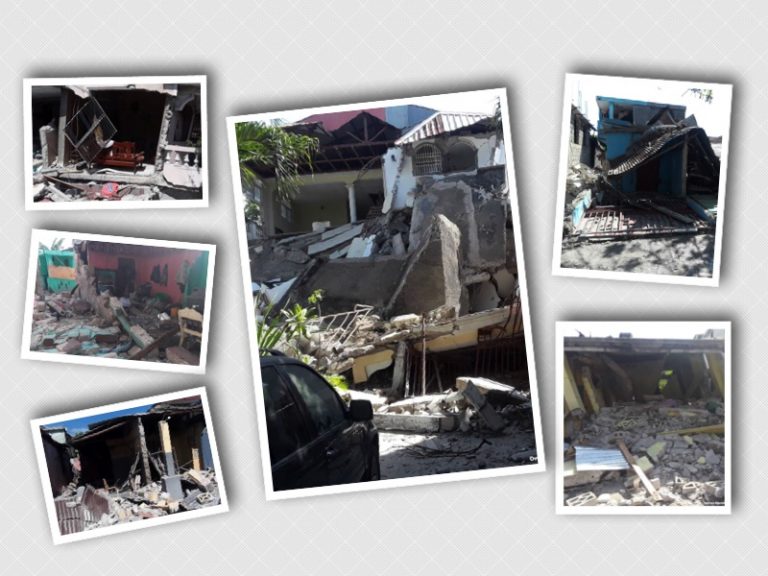No fewer than 304 people died and hundreds were injured or missing after a 7.2 Magnitude earthquake struck southwestern Haiti on Saturday.
Thousands of fatalities are expected, like the quake that devastated the country 11 years ago.
Saturday’s measured between 7.2 to 7.6 magnitude was stronger and closer to the surface than the magnitude 7.1 quake that damaged much of the capital in 2010 and killed an estimated 300,000 people.
Within hours the US Geological Survey (USGS) estimated ‘thousands of fatalities’ and ‘tens of thousands of injuries in poor mountainous communities’.
Jerry Chandler, Haiti’s director of civil protection, told the Associated Press that the official death toll by 7pm (ET) stood at 304.
He said teams will be sent to the area for search and rescue missions.
According to the update provided by the authorities, the earthquake reduced churches, hotels and homes to rubble.
It was the latest tragedy to hit the poor Caribbean nation.
The quake, which was followed by a series of aftershocks, struck 8 km (5 miles) from the town of Petit Trou de Nippes, about 150 km west of the capital Port-au-Prince, at a depth of 10 km, the United States Geological Survey said.
Knocked down by quake in Haiti
Knocked down by quake in Haiti
Another house shaken by Haiti the earthquake
Another house shaken by the Haiti earthquake
That made the temblor which was felt as far away as Cuba and Jamaica potentially bigger and shallower than the magnitude 7 earthquake 11 years ago that killed tens of thousands in the poorest nation in the Americas.
This one – which occurred around 8:30 a.m. local time – hit farther away from the capital, however.
In Port-au-Prince, it was strongly felt but did not appear to have caused major damage, according to Reuters witnesses.
Still, Haiti’s Civil Protection service said the preliminary death toll already stood at 227 and Prime Minister Ariel Henry declared a month-long state of emergency.
The nearest big town was Les Cayes, where many buildings collapsed or suffered major damage, according to authorities, who said they were searching for survivors.
“I saw bodies being pulled out of the rubble, injured and perhaps dead people,” said Les Cayes resident Jean Marie Simon, 38, who was at the market when the earthquake struck and ran home to see if his family was safe.
“I heard cries of pain everywhere I passed through.”
His wife and two-year-old child had been bathing and rushed out to the street, naked, just before the front of the house crumbled. Simon gave his wife his shirt and they took refuge in the courtyard of a church with other locals.
His mother’s house had also collapsed.
“There are a lot of aftershocks and every time there’s one, people run and shout,” he said. “My legs are still trembling.”
In Les Cayes, locals said water had briefly flooded the coastal town of 126,000, causing panic amid fear of a tsunami, but then appeared to retreat.
Haitian media outlets reported some people along the coast had already fled to the mountains.
The U.S. Tsunami Warning System issued a tsunami warning after the quake, lifting it shortly thereafter.
U.S. President Joe Biden authorized an immediate U.S. response to the earthquake and named Samantha Power, administrator of the U.S. Agency for International Development, coordinator of the effort.
‘NEVER A BREAK’
The earthquake comes just over a month after the assassination of President Jovenel Moise, who had been ruling by decree, which deepened the country’s political turmoil.
Meanwhile, swaths of Haiti are facing growing hunger and healthcare services are overwhelmed by COVID-19.
Access by road to the southern region, where the quake struck, has been restricted by gang control of key areas, raising questions over how aid will be delivered read more
That region had only recently recovered from Hurricane Matthew, which struck in 2016, killing hundreds and causing widespread devastation.
Haiti is now in the probable track of Tropical Storm Grace which could bring heavy rains early next week.
“This country just never finds a break! Each year of mismanagement did not hurt but the cumulative effects made us vulnerable to everything,” said Haitian entrepreneur Marc Alain Boucicault on Twitter.
“It’s going to take years to fix things and we have not even started!”







